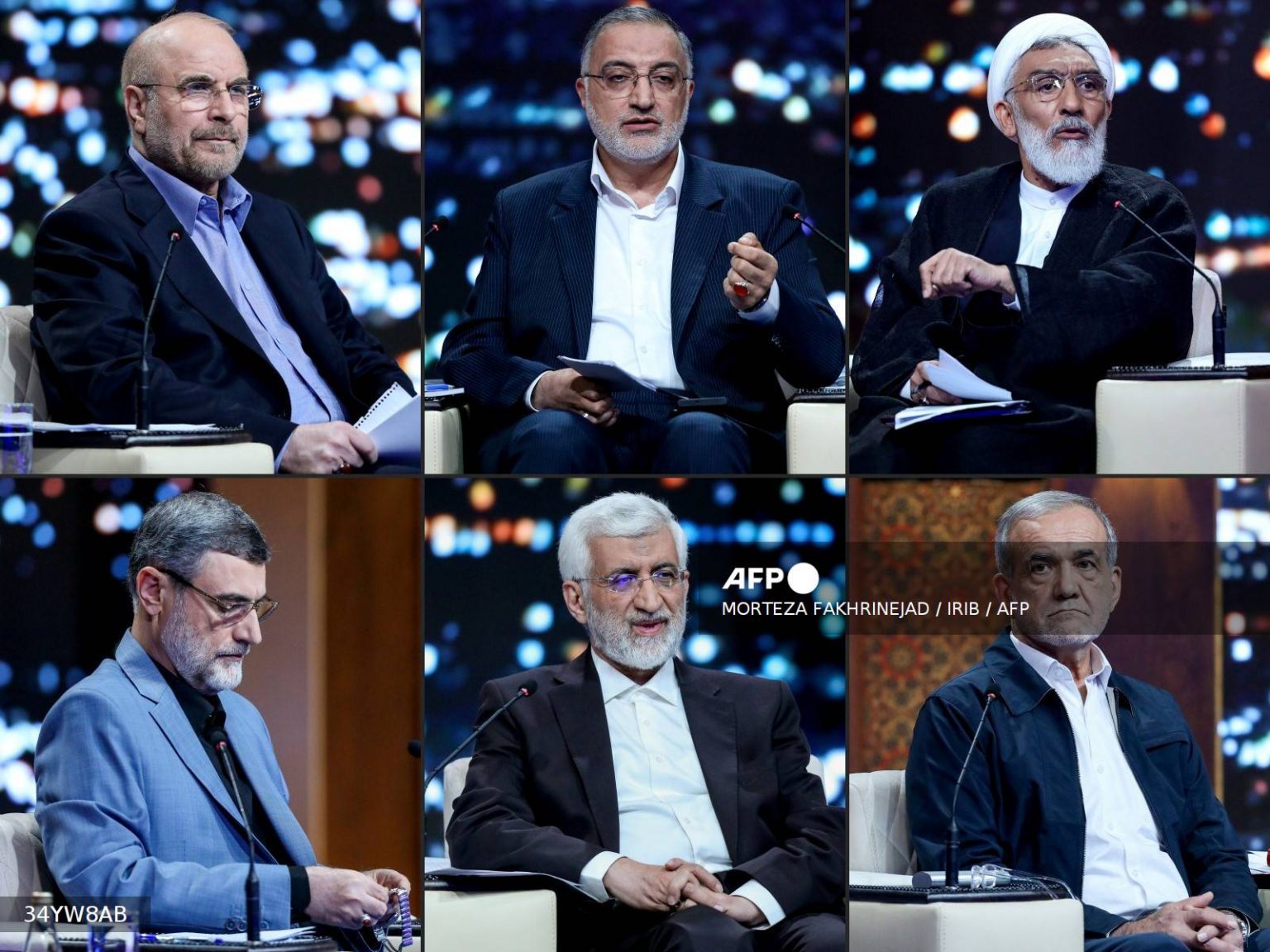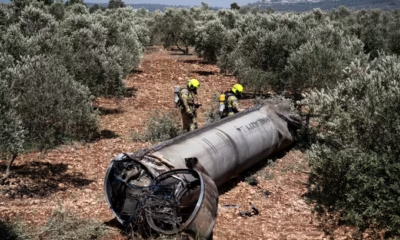Headline
Iran Election: Five Things To Know

Middle East powerhouse Iran votes on Friday in a snap election to replace President Ebrahim Raisi following his death in a helicopter crash last month.
Here are five facts about the Shiite Muslim country of 85 million people known as the Islamic Republic of Iran.
From Shah to mullahs
Formerly the ancient empire of Persia, Iran was dominated during part of the 20th century by the Pahlavi dynasty.
Shah Mohammad Reza, accused of authoritarianism and criticised for his modernist reforms, fled in 1979 after months of protests.
His main opponent, Shiite cleric Ayatollah Ruhollah Khomeini, returned from exile and immediately established an Islamic republic, one of the few that exist in the world.
The authority lies with its supreme leader, who since 1989 has been Ayatollah Ali Khamenei, successor to Khomeini.
The supreme leader’s power is greater than that of the president, who is elected by universal suffrage.
The Islamic Revolutionary Guard Corps was set up as the ideological defenders of the Islamic Republic after the 1979 revolution.
READ ALSO: Nigerian Army Deploys 177 Personnel To Guinea-Bissau For Peacekeeping
Veil of contention
Since 1979, Tehran has imposed a strict Islamic code on women, officially to protect them. In public, they are obliged to wear loose clothing and a hijab — a veil covering their hair and neck.
Respect for the veil is required of all Iranians and foreigners, while morality police patrol the streets to ensure compliance.
In September 2022, massive protests broke out across the country after Masha Amini, a 22-year-old Iranian Kurd, died following her arrest by the morality police in Tehran for allegedly breaching the strict dress code.
Hundreds of people were killed and thousands were arrested in the protests.
Iran, which topped the table for the most recorded death penalties in 2023, has executed nine men in cases related to the protests, according to Amnesty International.
READ ALSO: Iran President Had ‘Lot Of Blood On His Hands’ – White House
Iran and Israel: arch-enemies
Under Raisi, Iran sought improved relations with China and Russia while mending ties with Arab neighbours, mainly its major regional rival Saudi Arabia, to avert deeper isolation.
But its relations with Israel remain particularly fraught and have only grown more tense since Iran-backed Palestinian militant group Hamas launched the October 7 attack on Israel that started the bloodiest-ever Gaza war.
Iran is officially committed to the destruction of what it calls the “Zionist entity”, and in April for the first time launched a direct attack against Israel involving hundreds of missiles and drones, most of which were intercepted.
Nuclear fallout
In 2015, Iran reached a landmark agreement with major powers to accept limits on its nuclear programme in exchange for easing sanctions.
But the United States, under then-president Donald Trump, withdrew from the hard-won deal in 2018 and reimposed sanctions.
READ ALSO: Iran Gets Interim President After Raisi’s Death
Iran responded by rolling back most of its commitments.
According to the International Atomic Energy Agency, Iran is the only non-nuclear weapon state to enrich uranium to the high level of 60 per cent — just short of weapons-grade — while it keeps accumulating large uranium stockpiles.
The IAEA has said that Tehran now has enough material to build several atomic bombs.
Filmmakers: prized and jailed
Iran’s cinema is unparalleled in the region, with modern masters including the late Abbas Kiarostami and Asghar Farhadi, a two-time Oscar winner.
But working in film in Iran today can be risky for those who speak out against the authorities.
Several prominent directors have been arrested or jailed, including Jafar Panahi and Mohammad Rasoulof, who was in the spotlight at this year’s Cannes festival after he fled Iran to escape a jail sentence.
He is now living in exile in Europe.
AFP
Headline
Insecurity: US Congressman Riley Moore Reveals Trump’s Mission In Nigeria

US Congressman Riley Moore has dismissed insinuations that President Donald Trump is attempting to bring war to Nigeria.
Moore made the remark in a post on his verified X handle on Monday.
His comments followed a US military airstrike on a terrorist enclave in north-west Nigeria on Christmas Day, reportedly carried out on the directive of President Trump.
“President Trump is not trying to bring war to Nigeria, he’s bringing peace and security to Nigeria and to the thousands of Christians who face horrific violence and death.
READ ALSO:Russia Calls up 135,000 Military Personnel
“The strikes against ISIS on Christmas, in coordination with the Nigerian government, have given hope to the Christians in Nigeria,” he said.
Recall that the lawmaker had previously stated that President Trump is focused on ending the killing of Christians in Nigeria.
It will be recalled that Moore led a US delegation on a fact-finding mission into alleged Christian genocide in Nigeria some weeks ago.
During his brief stay in the country, Moore travelled to Benue State, where he interfaced with religious and traditional leaders, as well as internally displaced persons.
Headline
Russia Calls up 135,000 Military Personnel

Russia has enlisted 135,000 conscripts for military service in 2026, following the conclusion of the autumn army draft by the Defense Ministry.
A statement on Monday said most personnel have been assigned to training units and military formations where they will “get a military specialty and learn to operate modern military hardware.”
The conscripts can choose to serve in any of the various military branches and armed services after an assessment of their health condition and the results of psychological examinations.
READ ALSO:Russian Strike On Odesa Region Kills Eight, Injures 27
The ministry disclosed that 680 recruits have joined scientific and research-production units, while 240 from the country’s national teams in Olympic disciplines joined sports companies.
However, military personnel who have served the established term of military service have been discharged and sent to their places of residence.
The latest enlistment confirms Russia is shoring up its troops deployed to the ongoing special military operation in Ukraine ahead of the new year.
READ ALSO:Putin Says Russia Ready For War, Blames Europe For Sabotaging Peace
A fortnight ago, European leaders reaffirmed their pledge to form a multinational force–under the aegis of the Coalition of the Willing–to assist Ukraine in securing land, skies, and seas.
The pledge is one of the six commitments the EU and heads of state developed for Ukraine’s security and economic recovery support measures.
In an interview with TASS on Sunday, Russian Foreign Minister Sergey Lavrov condemned Europe’s insistence on sending military forces to Ukraine.
“We have said many times that our Armed Forces would view them as a legitimate target,” he said, warning that anyone who attacks Russia would face “a devastating blow.”
Headline
How Our Airstrikes Stopped Christmas Attacks In Nigeria — US Lawmaker

Riley Moore, a member of the United States House of Representatives from West Virginia’s 2nd District, has linked the absence of Christmas attacks in Nigeria this year to US military airstrikes carried out against Islamist militants on Christmas Day.
In a post on his official X account on Saturday, Moore contrasted the situation with the past two Christmas seasons, during which he claimed Christians were killed in attacks across parts of Nigeria.
The lawmaker noted that this year’s response targeted extremist groups instead of marking another period of violence.
READ ALSO:Rep Moore Confirms 12 Tomahawk Missiles Launched In Sokoto
He added that US forces acted decisively against militants in coordination with the Nigerian government.
“For the past two Christmases, Christians have been murdered in Nigeria. This year, thanks to @POTUS, Radical Islamic Terrorists were on the receiving end of 12 Tomahawk missiles as a present.
“The successful strikes on ISIS, in coordination with the Nigerian government, are just the first step to secure the country and end the slaughter of our brothers and sisters in Christ,” Moore wrote.
US President Donald Trump said on Thursday that American forces had conducted deadly strikes against Islamic State terrorists in north-western Nigeria.
Trump, who spoke via his Truth Social platform, warned that more attacks would follow if the militants continued killing Christians, adding that the Department of War executed numerous “perfect strikes.”

 Headline4 days ago
Headline4 days agoJUST IN: US Forces Bomb Terrorists Camps In Nigeria

 News5 days ago
News5 days agoOkpebholo Slams ₦25bn Libel Suit On Edo PDP Chairman

 Headline4 days ago
Headline4 days agoUS Dept Of War Shares Video Of Air Strikes In Nigeria

 News4 days ago
News4 days agoPHOTOS: SGF George Akume Weds Ooni’s Ex-Queen

 News23 hours ago
News23 hours agoBREAKING: Anthony Joshua Involved In Road Accident

 News4 days ago
News4 days agoTrump’s Airstrikes: Halt Military Cooperation With US Immediately – Sheikh Gumi Tells Tinubu Govt

 News4 days ago
News4 days agoShehu Sani Reacts To Trump’s Military Strikes In Nigeria

 Headline4 days ago
Headline4 days agoU.S. Lawmaker Reacts To Nigeria, U.S. Airstrikes

 News2 days ago
News2 days agoEx-Edo Gov Obaseki Reacts As His Cousin Is Beaten, Stripped

 News5 days ago
News5 days agoYULETIDE: UBTH CMD Charges Nigerians To Be Hopeful In Coming Year






























